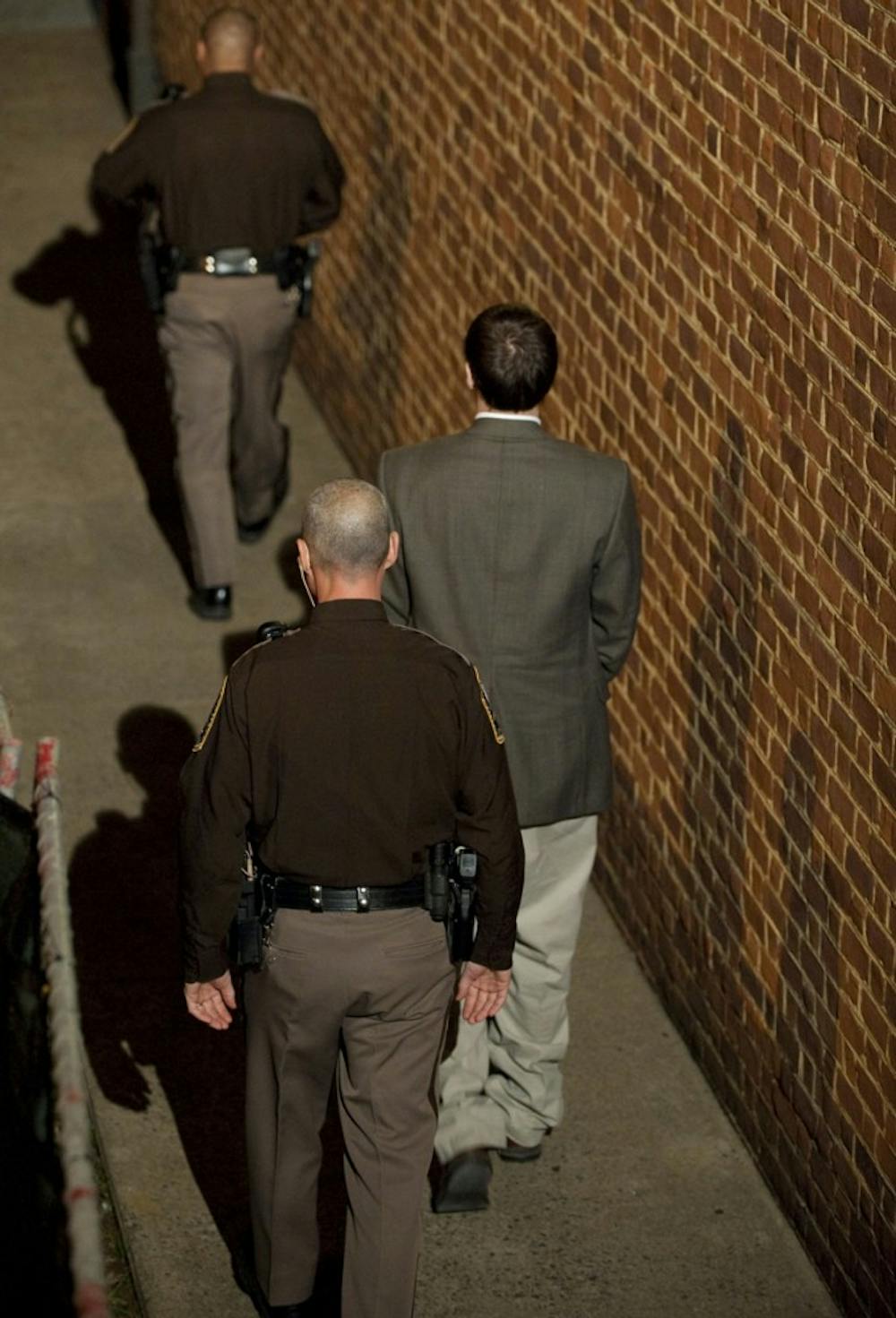Former University student George Huguely was sentenced to 23 years in prison Thursday after a judge effectively reduced his jury-recommended sentence by three years. His lawyers say he will appeal the sentence.
Thursday’s sentencing is the potential closing act in a case that has spanned more than two years and has captivated the attentions of the University community.
In February a 12-person jury convicted Huguely of the second-degree murder of fellow University student and women’s lacrosse player Yeardley Love in May 2010 and recommended he serve 25 years, along with an additional year for grand larceny.
Huguely’s attorneys, Francis Lawrence and Rhonda Quagliana, implored the court to lessen his sentence to 14 years, the minimum allowed by Virginia sentencing guidelines. The defense called four family members and friends to the stand who characterized Huguely as a “gentle, caring” young man.
Judge Edward Hogshire, however, largely disregarded this recommendation, although he did shorten the sentence by two years. In addition, Hogshire ordered that Huguely will serve his yearlong sentence for grand larceny and second-degree murder concurrently, bringing his total time in prison to 23 years.
“Unlike Ms. Love, Mr. Huguely still has the majority of his life remaining,” Hogshire said. “He was not the young man on [the evening of Love’s death] that was represented by his family. He’s a very different person, and that person has taken a very precious life.”
Quagliana opened the hearing by asking for a “just punishment” that was “fair and consistent with other sentences, not an automatic response or one that appeases the loudest voices.” She cited other murder trials where the perpetrators used weaponry and received shorter sentences than Huguely’s as a comparison. She painted the jury’s recommendation as excessive, a result of the high-profile nature of the case.
“This case lent itself to easy stereotypes,” she said. “Immediately after George’s arrest, assumptions were made. There was a rush to judgment, and [he became] the stereotype of selfish, indulgent, rich, college athletes.”
Commonwealth’s Attorney Dave Chapman said Huguely was recklessly conscious of his actions, countering that Love’s homicide was the tragic climax in a series of increasingly violent episodes from Huguely.
“This is a person who sooner or later was going to seriously injure or kill someone,” he said.
In 2008 the former men’s lacrosse player was arrested for public intoxication and resisting arrest in Lexington, Va. For his sentencing, Chapman called three witnesses who shed new light on Huguely’s history of violence.
Former University student Gavin Gill, Huguely’s former teammate, said the defendant broke into his apartment in the spring of 2009, awoke him in bed and severely battered his face. Earlier that night, an intoxicated Gill had had “intimate contact” with Love in her apartment. Although his injuries were extreme enough to require a CT scan, Gill never told authorities Huguely had found him sleeping before the attack.
“I wanted to make clear to our coach that I was in the wrong as well,” Gill said. “And in a short-sighted way, I didn’t want [Huguely] to be punished.”
Former women’s lacrosse player Claire Bordley, who graduated with a master’s degree in 2009, said Huguely put his hands around her neck during a December 2009 confrontation at Boylan Heights. She told detectives after the altercation that “it was a quick incident in a dark, noisy bar” and she declined to press charges.
Additionally, University graduate Stephanie Aladj testified that after a night of heavy drinking together in April 2010, she saw Huguely strike former University tennis player Sanam Singh for no apparent cause.
“[Huguely] had three wake-up calls preceding the murder of Yeardley Love,” Chapman said in his closing statement. “The sentence was perfectly appropriate for a young man who exhibited violence in the past, had it brought to his attention and failed to benefit.”
The defense, on the other hand, brought Huguely’s aunt and uncle to dismiss those acts as alcohol-induced exceptions to an otherwise immaculate record. Likewise, Father Joseph Scordo of Charlottesville’s St. Thomas Aquinas Church said he had ministered to Huguely every week for the past two years and found the defendant was “not the same person the media describes as harsh, wild [and] out-of-control.”
“Those three instances don’t define George; the people who testified about him do,” Lawrence said. “We understand that … things happen [because of alcohol]. But they’re not malevolent and evil, and they don’t warrant the out-of-line sentence of the jury.”
Hogshire favored the prosecution’s stance and found Huguely’s violent acts were not isolated incidents but a pervasive problem that merited strict punishment. Huguely also received three years of probation following his release.
With a quavering voice, Huguely addressed the court before Hogshire announced the sentence. It was the first time he has spoken publicly during the trial.
“Mrs. Love and Lexie, I’m so sorry for your loss,” Huguely said. “I hope that you are able to find peace. I want to thank my family and friends for all the love and support.”







